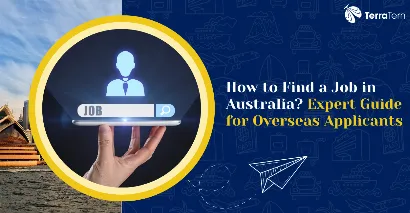Key Highlights
- Latest Facts and News
- Understanding the Australian Job Market
- Preparing Your Job Search Strategy
- Essential Requirements for Working in Australia
- Job Search Strategies and Platforms
- Networking and Professional Connections in Australia
- Top Paying Jobs in Australia
- Industry-Specific Job Opportunities for International Candidates
- Language and Cultural Barriers
- Resume and Application Optimisation for Australian Employers
- Recognition of Overseas Qualifications
- Success Stories: How Foreigners Found Jobs in Australia
- Conclusion
How to Find a Job in Australia: A Comprehensive Guide for Foreigners and Overseas Applicants
Want to know how to find a job in Australia? The job market success alongside superior living standards and a diverse population establishes Australia as a leading destination for employment seekers worldwide. Australia provides multiple advantages, whether you want an exciting new destination, better career progression or stronger finances. The following guide provides all the information for foreign people to secure a job in Australia.
Latest Facts and News

Here are some of the latest facts and news for people wondering how to find a job in Australia:
-
Unemployment Rate: Job market stability increased in Australia when the unemployment rate was revised to 3.7% in April 2023.
-
Government Investment: Australian taxpayers will fund $1.5 billion for skills development programs and training initiatives during the 2023-24 budget period to drive workforce expansion.
-
Remote Work Trends: The remote work sector has experienced a dramatic 60% growth in the past twelve months because Australians have adopted flexible work arrangements.
-
Healthcare Sector Growth: Healthcare experts expect the Australian healthcare industry to generate 250,000 new employment positions over the next five years due to rising healthcare requirements.
-
Pacific Engagement Visa: The Pacific Engagement Visa started its operations in July 2023 as a system that grants qualified Pacific workers the chance to settle in Australia.
Also Read: Australia Job Vacancy: Latest Pay, Scope & More
Understanding the Australian Job Market
There are unprecedented chances in the Australian employment scene, and both local and foreign job seekers can use about 175,946 available vacancies as of July 2025. Employment in Australia involves a financial and competitive terrain with various job opportunities in major cities and regional zones.
Australia's unemployment rate currently sits at approximately 5%, positioning it favourably among OECD countries. The market has a certain flair in healthcare, education, construction, and technology, where skilled workers have plenty of career opportunities. For those wondering how to find a job in Australia for foreigners, the country's immigration-friendly policies and skills-based visa system make it an attractive destination for international talent.
Key Market Characteristics
Here are key market characteristics:
-
Demand towards healthcare professionals, teachers, and workers of all kinds of construction
-
Mean full-time salaries of AUD 1,605 per week.
-
Strategic preparation needs to be involved in the competitive application process.s
-
Domestic options that include quicker visa processes and a quality of life
Job opportunities in Australia by region:
Job opportunities in Australia vary by region, which is an essential point for finding a job in Australia:
-
New South Wales (Sydney): This metropolitan dominates financial services, engineering technology, and healthcare industries.
-
Victoria (Melbourne): The economy actively supports education activities, the manufacturing base, and artistic institutions.
-
Queensland (Brisbane): This hub serves tourism and maintains mining operations and construction roles.
-
Western Australia (Perth): Diminishing resource extraction activities and industries support the economic foundation of this region.
-
South Australia (Adelaide): The economy in this region focuses intensely on defence operations, wine manufacturing, and the production of goods.
Preparing Your Job Search Strategy

Preparing a good job search strategy is crucial for finding a job in Australia for foreigners:
Researching Visa Requirements
Foreign workers need complete knowledge of visa solutions to find suitable employment opportunities. Popular options include:
-
Skilled Independent Visa (subclass 189): For skilled workers without employer sponsorship.
-
Employer-Sponsored Visas: For workers with a job offer from an Australian employer.
-
Working Holiday Visa (subclass 417/462): This visa serves the needs of students who want temporary work opportunities.
Foreign job seekers must check the Australian Department of Home Affairs website for information on ongoing eligibility criteria and application procedures.
Tailoring Your Resume and Cover Letter for Australian Employers
Australian resumes are usually restricted to two or three pages and present information about skills and specific achievements. Key tips:
-
Keep your wording professional and adapt the information to match every professional position.
-
Showcase your professional skills and concrete accomplishments that match what the position demands.
-
Your cover letter must connect your work history to the available position.
Pro Tip: Applied Australian-style resume templates will help streamline the application process while conforming to local industry standards.
Essential Requirements for Working in Australia
It is essential to know the law before landing a job in Australia as a foreigner; therefore, before learning how to find a job in Australia as a foreigner, you need to understand the laws of legally acquiring a job in Australia. Lawfully working in Australia starts with having the right visa status and obtaining all the requirements in writing.
Visa Requirements by Category:
|
Visa Type |
Duration |
Target Audience |
Processing Time |
|
Subclass 189 (Skilled Independent) |
Permanent |
Skilled professionals |
8-10 months |
|
Subclass 190 (State Nominated) |
Permanent |
State-sponsored applicants |
9-12 months |
|
Subclass 491 (Regional Work) |
5 years |
Regional area workers |
6-8 months |
|
Working Holiday Visa |
1-3 years |
Young professionals (18-30) |
1-3 months |
Essential Documentation
-
Tax File Number (TFN): Required before starting work, obtainable online
-
Australian Bank Account: can be opened before arrival, even remotely
-
Professional Accreditation: this is a sector-specific certification by institutions such as Engineers Australia or AHPRA
-
English Fluency Qualification: IELTS or equivalent in the majority of job positions
Preparing the visa is a necessity when conducting a job search because most employers want to hire candidates who already have the work rights. In the case of international student applicants, they ought to start applying for their visas early, because it takes more than 12 months to process permanent visas.
Also Read: Job Portals in Australia: Find Your Dream Job
Job Search Strategies and Platforms

Learning how to get a job in Australia involves using various job channels and information on online recruitment that prevails in Australia. The topmost alternative integrates online mechanisms, recruitment agencies, and networking mechanisms.
Primary Job Search Platforms:
-
SEEK: Australia's largest job platform with 80%+ market share
-
LinkedIn Jobs: Developing a site with the perks of a professional network.The East India Company. The East India Company was an English company that established successful trading relationships by settling along the Indian coast and occupying European territory when the British ruled India.
-
Indeed Australia: Listings in all industries
-
Jora: good local and entry opportunities
-
CareerOne: Solely in professional and management appointments
Advanced Search Strategies:
Here are some advanced search strategies:
-
Install auto alerts for the target keyword and places
-
Narrow down results with the help of Boolean search operators
-
Go directly to the company's career websites to apply to unadvertised jobs
-
Use the LinkedIn network to link with the hiring managers
-
Joining up with industry-specific recruiting agencies
Recruitment Agency Benefits
Recruitment agencies facilitate about 30 per cent of Australian job placements. In the recruitment process, they provide amenities such as helping one prepare for an interview, optimizing their resume, and negotiating a salary. It is also free to optimize because the agencies receive payments from the employers, hence registering in more than one place is beneficial.
Government Resources
Workforce Australia portal offers an all-inclusive job seeking experience, including employment counselling, work skills evaluation and job opportunities to the qualified applicants.
Networking and Professional Connections in Australia
Creating professional networks contributes a lot to success when one wants to learn how to get a job in Australia as an overseas student. Australian work culture emphasizes the importance of relationships and informal networks; thus, emphasis is placed on developing a career.
Digital Networking Strategies
Here are some digital networking strategies:
LinkedIn Optimization
-
Make an Australia-oriented profile with the note of planning to move
-
Reach out to the Australian professionals in the target industries
-
Read the Australian company materials and industry forums
-
Belonging to Australia-related professional groups and discussion forums
Industry Associations
-
Become a member of an interested professional organisation, landing
-
Go to virtual events, webinars
-
Use online organisations or forums
-
Be someone whom professional people can mentor
Local Networking Opportunities
Here are some local networking opportunities:
Professional Meetups
-
Networking activities within the industry in big cities
-
Sydney, Melbourne and Brisbane technology get-together gatherings
-
International live event networks open to international professionals
Community OrganOrganizations
-
search groups of expatriate communities
-
Cultural organisations providing professional associations, and community-based organisations develop local relationships
University Alumni Networorganizations
-
National alums to benefit
-
Participate in the Australian university community networking events
-
Get access to international graduate career services
Effective Networking Approaches:
-
Prelude Investigations: Get to know about the Australian business culture
-
Differentiate Yourself: tell something about your international experience
-
Stay in Touch with New Ones: Keep in touch with new acquaintances
-
Visit Industry Functions: Put importance on relationship building in person
-
Speak Truthfully: The Australians appreciate being told the plain truth
Also Read: Freshers' Job in Australia for Indians: A Comprehensive Guide
Top Paying Jobs in Australia
Here are some of the highest-paying professions pivotal to finding a job in Australia:
|
Job Role |
Average Salary (AUD) |
Average Salary (INR) (Approximate) |
|
General Practitioner |
$150,000 - $300,000 |
₹8,250,000 - ₹16,500,000 |
|
Mining Engineer |
$130,000 - $200,000 |
₹7,150,000 - ₹11,000,000 |
|
IT Manager |
$120,000 - $180,000 |
₹6,600,000 - ₹9,900,000 |
|
Construction Manager |
$100,000 - $150,000 |
₹5,500,000 - ₹8,250,000 |
|
Financial Analyst |
$90,000 - $130,000 |
₹4,950,000 - ₹7,150,000 |
|
Registered Nurse |
$80,000 - $120,000 |
₹4,400,000 - ₹6,600,000 |
|
Civil Engineer |
$90,000 - $140,000 |
₹4,950,000 - ₹7,700,000 |
|
Data Scientist |
$110,000 - $160,000 |
₹6,050,000 - ₹8,800,000 |
|
Secondary School Teacher |
$70,000 - $100,000 |
₹3,850,000 - ₹5,500,000 |
|
Marketing Manager |
$95,000 - $140,000 |
₹5,225,000 - ₹7,700,000 |
Industry-Specific Job Opportunities for International Candidates

Complete Section Content:
Studying how to get a job in Australia in the foreign market would also help you understand which industries are actively recruiting international talent and thus prioritise our job search. Australia's Skilled Occupation List prioritises professions experiencing critical shortages.
High-prioritizers for International Workers
Here are some high-demand sectors for international workers:
Healthcare & Medical
-
Allied health professionals, specialists, registered nurses
-
Median wage: AUD 70,000-120,000 per annum
-
Fast-tracked visa opportunities that exist
-
Local opportunities that involve extra visa privileges
Education & Training
-
STEAM teachers, particularly in primary and secondary divisions
-
Higher education teachers and occupational trainers
-
Middle income: AUD 65,000-95,000/ Year
-
Community sponsorship, the state nomination schemes that recruit actively
Construction & Engineering
-
Qualified tradespeople, project managers and civil engineers
-
Mean salary: AUD 80,000-130,000/per annum
-
Good local demand accompanied by a visa incentive
-
Job opportunities that would require immediate employment are available
Information Technology
-
Software developers, Security Professionals, Data Analysts
-
Mean salary: USD 85,000-$140,000 each year
-
The rising number of remote work possibilities
-
The startup ecosystem has been a great recruiter of the overseas workforce
Professional Services
-
Accountants, lawyers (with Australian qualification recognition)
-
Business analysts and management consultants
-
Salary Range: AUD 70,000- 110,000 per year
Also Read: How to Get a Job in Australia from India? Latest Guide
Language and Cultural Barriers

When foreigners try to find work in Australia, language and cultural differences make job acquisition particularly challenging. Companies need employees who demonstrate proficiency in the English language to defeat these challenges. Joining language fundamental classes at TAFE or local community colleges can improve your learning potential. You should use Online resources, including Duolingo, Babbel, and Rosetta Stone, to enhance your language learning process. People who want to develop real-world confidence can boost their ability through participation in conversation groups alongside local meetups.
Understanding the unique elements typical of Australian workplace cultures is equally vital. Staff working in Australian settings appreciate the free exchange of ideas, teamwork, and cultural acceptance of multicultural workforces. The organisational structure supports open communication because employees can express their ideas. You can accelerate your adaptation by studying these norms through online materials, structured cultural orientation sessions, and direct firsthand reports. The guidance of Australian professionals and the knowledge of established expat workers about the work adds essential insights to your integration process.
Resume and Application Optimisation for Australian Employers
Developing powerful applications increases the chance of succeeding in learning how to get employment in Australia. Australian employers extensively use Applicant Tracking Systems (ATS), requiring strategic resume optimisation and culturally appropriate application approaches.
Australoptimizationtandards:
Here are the standards for Australian resumes:
Format Requirements
-
2-3 pages max length
-
Chron Time Frame mostoslav
-
An email address that is business-appropriate is a requirement
-
No photo or personal details (age, marital status)
-
Include Australian mobile number (or note international contact)
Essential Sections
-
Professional Summary: 3-4 lines with signalling most essential achievements
-
Core Competencies: Capable of meeting the job demands
-
Professional Experience: Outcome-based descriptions of quantified accomplishments
-
Education and Qualifications: Australian equivalent qualifications
-
References: Available upon request (don't include contact details)
Also Read: How to Find a Job in Australia? Experts' Job Hunt Guide
ATS Optimisation Techniques:
|
Strategy |
Implementation |
Impact |
|
Keyword matching |
Mirror job posting language |
75% higher ATS pass rate |
|
Simple formatting |
Avoid graphics, tables, and columns |
60% better parsing |
|
Standard headings |
Use conventional section titles |
50% improved readability |
|
File format |
Submit as .docx or PDF |
40% better compatibility |
Cover Letter Best Practices:
The Australian cover letters must be short and precise and show that the position and company are understood. Avoid the temptation only to provide criteria when it comes to address selection, and instead, ensure you focus on bringing out international experience as a special value addition.
Application Process Excellence:
-
Do your Research: Learn the business culture and values
-
Personalise Applications: Use a resume and a cover letter to fit a job
-
Take Instructions Literally: Use the requisite application requirements literally
-
Apply with Speed: Give as quick a reply as possible to a posting
-
Professionally Follow Up: Follow up briefly a week later, where possible
Interview Preparation:
Australian interviews typically include behavioural questions using the STAR method (Situation, Task, Action, Result). Put together samples of problem-solving, working in teams, and flexibility, with an international background being an advantage.
Recognition of Overseas Qualifications
Australian professions demand particular qualifications, and when foreign credentials are required, Australian standards must formally approve them beforehand. To rerecognize overseas qualifications according to Australian standards, referencing the Australian Government's Qualifications Recognition site. This site provides detailed step-by-step guidance.
-
Document Submission: Academic transcripts, certificates, and professional documents must be collected. Send your documents to the authorised assessment body of the Australian Skills Recognition Information Office (ASRIO).
-
Assessment Process: Additional evaluation of your qualifications establishes how well they match Australian professional standards. The assessment process usually requires payment of processing fees during established timeframes, which you must factor into your planning.
-
Professional Licensing: The requirements for specific professions, including healthcare engineering and teaching, mandate supplementary validation from professional boards for practising in your field. Application for Australian compliance requires testing or training and additional certification programs for students earning international qualifications.
By completing these steps and providing precise documentation, Australia will accept your qualification, leading to expanded career opportunities.
Also Read: How to Get a Job in Australia from India? Latest Guide
Success Stories: How Foreigners Found Jobs in Australia
Real-life stories from international professionals who secured employment:
-
Case Study 1: A Software Developer from India
Through Lin, the Indian software developer obtained employment in Australia by successfully networking with local professionals. Through professional connections he built with Australian professionals in his,andng with joining relevant,g roups he engaged in conversations to develop relationships. His resume secured a recruiter's attention by emphasising technical abilities in Australia. After several video interviews, the tech company based in Sydney emphasised its specialised
-
dy 2:Specializedd tin in the Philippines. A nurse accomplished Specialised working in Australia through an employer-sponsored visa. She focused her research on Australian healthcare centres requiring additional skilled staff and applied directly to aged care organisations. She obtained employment, which led to her work visa being granted through her repetitive application and detailed references. Before becoming eligible to work in Australia, she must finish the bridging program and register her nursing skills according to Australian certification. Her systematic application metho,ander strong determinatio,n enabled her to start a healthcare career in Australia with financial security.
-
Case Study 3: An Engineer from South Africa
Employment opportunities at Seek and Indeed allowed this South African engineer to thrive in the job market. Regional areas that showed critical skill deficits became his main target for job applications. The job applicatioemphaemphasizedd sls transferablapplication emphasisedd global employmentemphasizedd which matched what eemployment,ter conducting video interviews with the company, the applicorganizationc a job at a Weminiorganizationorganizationaions. His organisation was accepted because employers needed his engineering skills, demonstrating the value of applying to fields with critical skill shortages.
Conclusion
Foreign individuals must spend time preparing for Australian job opportunities, which require determination and a detailed employment plan. Australia welcomes skilled professionals because its expanding job market creates multiple career possibilities within its inviting atmosphere. Your initial move should begin with sector investigation, resume improvement, and Australian industry professional networking.
Launch your Australian job search by subscribing to alerts and checking out job boards while contacting TerraTern.






